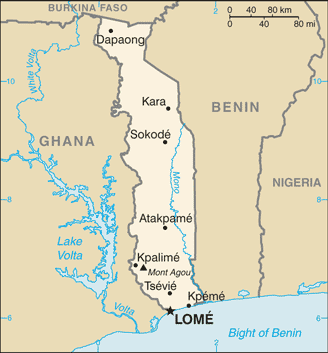Welcome to the Virtual Education Wiki ~ Open Education Wiki
Togo
For entities in Togo see Category:Togo
Experts situated in Togo
Togo in a nutshell

Togo (officially the Togolese Republic) is a country in West Africa bordering Ghana to the west, Benin to the east and Burkina Faso to the north. It extends south to the Gulf of Guinea, on which the capital Lomé is located.
The official language is French; however, there are many other languages spoken in Togo.
Togo's size is just less than 57,000 square kilometres (22,000 sq mi).
Togo has a population of 6.7 million people (CIA July 2011 est.).
Its capital is Lomé.
The country is dependent mainly on agriculture. The mild weather makes for good growing seasons. Togo is a tropical, sub-Saharan nation.
About a third of the population live below the international poverty line of US$1.25 a day.
Education in Togo
Two ministries in Togo are responsible for the administration of education: the National Ministry for Education and Research (MENR) and the Ministry for Vocational and Professional Training (METFP).
Prior to 2008, education was not free. The government abolished school fees in this year for pre-secondary level, allowing access to education for the poorest in Togolese society. The abolition of fees has however created a budget shortfall for the government, raising questions of how schools will cover costs of teachers and supplies [1]
School-level education
http://www.ccsenet.org/journal/index.php/ies/article/view/9102
http://www.spainexchange.com/guide/TG-education.htm
Pre- primary This level is not compulsory. Children enter at age two and it generally lasts for around three years.
Primary level Children enter at age five. Primary education lasts for six years and culminates in the primary certificate (CEPED) and provides access to junior secondary.
Secondary Level Secondary education is divided into two cycles. Children begin the junior level at age 12 and after four years take the graduation certificate (BEPD). This provides continuation to senior level secondary, which lasts for three years. At the completion of senior level, the school-leaving certificate part 1 is taken, providing access to 'terminal class'. Following this, the school-leaving certificate part 2 is taken, success in which provides a route to higher education.
Further and Higher education
Universities in Togo
- University of Lome
Polytechnics in Togo
Colleges in Togo
Education reform
Administration and finance
Quality assurance
Information society
ICT in education initiatives
Virtual initiatives in schools
Virtual initiatives in post-secondary education
Derived from 2007 Infodec ICT in Education report by Osei Agyeman-Duahl [2]
Campus Numérique Francophonie de Lome
Created in 1996 through the collaboration of four universities, including the University of Lome, and the Agence Universitaire de La Francophonie (AUF). The facility connects other universities from the Francophone world and allows Togolese students to pursue e-learning courses. The centre offers access to the following services: querying databases, control of primary documents, web hosting, free Web navigation, training in information technology and free software (introduction to Internet content production), distance education (international environmental law, human rights, new educational technologies). [3]
AUF Campus Numérique Francophone de Lome website [4]
African Virtual Campus
The University of Lome joined the African Virtual Campus (AVC) initiative in 2010. This brings together three institutes from the University of Lome: the IT and mathematics centre (CIC-UL); the distance learning centre (CFAD); and, the National Institute of Education Sciences (INSE).
The virtual network has been created in respect of the universities most urgent educational needs, and comprises three sub-networks:
- Sub network I will be made up of three virtual centres combining the University of Lome, the University of Kara and the Ecole Normale Superieur (teacher training, production, quality assurance)
- Sub network II will be made up of two virtual centres combining the CNP, teacher training institutes (ENI) and secondary level continuous teacher training centres
- Sub network III will be made up of one virtual centre combing technical and vocational teacher training centres. [5]
- “The AVC gives us the opportunity to improve our teaching capacity using ICTs. It enables us to build up many skills - methodological, organisational, technological, pedagogical and legal . . . The model means a pooling of resources throughout Africa, e-learning for students, teachers and adults en masse, and the integration of visually handicapped students into our education system.”
Lessons learnt
References
For OER policies and projects in Togo see Togo/OER